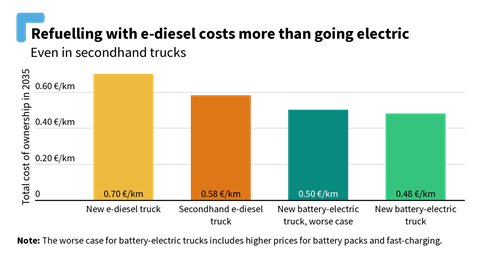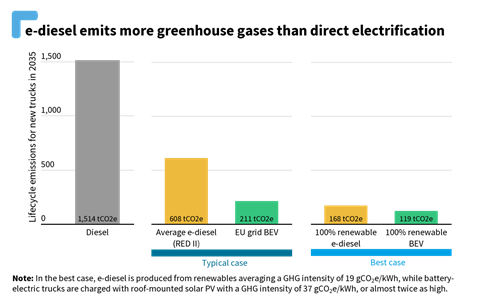E-fuels for trucks are expensive, scarce, and less environmentally friendly, according to a recent study by Transport & Environment (T&E).
According to a Transport & Environment (T&E) report, by 2035, driving a truck on e-diesel will cost 47% more than running a BEV (full electric) vehicle. “This is because a battery-electric truck’s cheaper energy and maintenance expenses rapidly balance its higher purchase price.”
E-diesel, a type of synthetic diesel, is made from carbon dioxide, water, and electricity in a process driven by renewable energy sources to produce blue crude, a liquid energy carrier that is subsequently processed to produce e-diesel.

By 2035, purchasing and operating a new long-haul diesel truck powered by pure e-diesel would be 47% more expensive than purchasing and operating a battery-electric truck. This is because a battery-electric truck’s cheaper energy and maintenance expenses soon balance its higher purchase price.
Even in the most hopeful scenario, e-fuels are 15% more expensive than battery-electric trucks, according to the report. In this scenario, e-fuels are used in a used vehicle, and a BET with high battery and recharging expenses is compared.
Max Mollière, e-mobility data analyst at T&E, said: “Cost is a huge consideration for road freight companies, which is why battery-electric trucks are the way forward. E-fuels are a desperate attempt by the fuel industry to throw themselves a lifeline at the expense of hauliers operating on thin margins. Why force expensive e-fuels upon them when there is a cleaner and cheaper solution at their fingertips? Europe recently announced it will not use e-fuels in cars for good reason, so let’s put trucks on the same path.”
A vehicle driven by e-diesel would typically release about three times the GHG emissions of a BET charged with average grid energy during its lifespan. Even if 100% renewable energy is utilised for e-fuel generation and BET charging, an e-diesel truck emits 41% more than a BET. Despite greater manufacturing emissions from battery production, e-fuel vehicles release much more GHG emissions during their lifespan than BETs. This is due to the fact that the majority of GHG emissions occur during the driving phase, and trucks have large mileage.

“After its attempt with cars, the fossil fuel industry is hoping to resurrect e-fuels in trucks. The claim that this technology is a scalable solution to decarbonise is wrong for cars and new evidence shows it’s also wrong here. They will jeopardise the transition to electric trucks and lock-in diesel technologies for much longer than our planet can sustain,” concluded Max Mollière.













